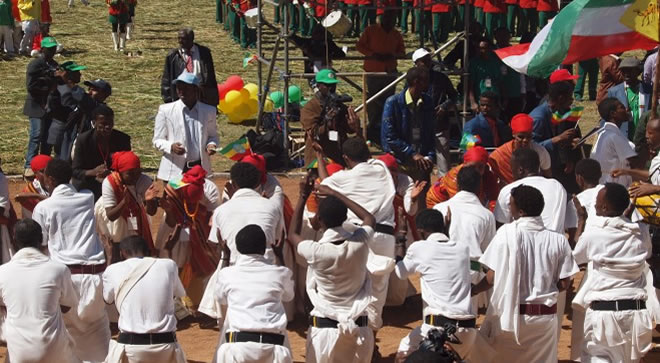
The eighth anniversary of Ethiopian nationalities festival, Jigjiga, Ethiopia - Photo (HOL)
Mohamed H.Bahal
Sunday, December 15, 2013
In a period of twenty one years, Ethiopia has shown remarkable transformation from feudal system into a capitalistic nation that embarked on economic and social success in urban improvement, modern highway system, transformation of peasant agriculture into commercial farming, and attracts foreign investment in industrialization projects.
The core of such successes came from people who believe in the shrine of nationhood and the unity of their country.
While Ethiopia was undergoing such economic transformation, Somalia was heading towards disintegration into a governance system so alien to a united Somalia. The present system of federalism was crafted by unholy alliances of UN, IGAD, and Europeans who after many years of negotiations came to believe that the Somalis have more pledges to clanism than nationhood.
The medical subscription given to them happened to be a bitter pill that can’t be swallowed.
Right on the eve of forming federal system in different regions, it is apparent that clan feuds among the people living in the same districts came to the surface. This shows that the system has so much loophole that it can never result cohesive national government. It is a hodgepodge system that promotes clanism, lacks economic vitality, puts the regions on the mercy of central government for financial handout. Majority of the regions that will embody federalism, their people have no market economy, because they are either pastoralist or subsistent farmers. Despite this fact, the formation of regional governments emulate that of central government headed by president, cabinet ministers, and parliament.
The constitutional wrangle that pops up every now and then and the challenges erupting from regional leaders, like Farole, is a clear indication that the system is elusive and inapt that can’t function unless the constitution is subjected to review for amendment.
If federalism works in Ethiopia why it doesn’t work in Somalia? Ethiopians are people who subjected to rule and law for more than hundred years. They are zealous and patriotic. If even there are particular groups who oppose the government their dedication to their country remains unchanged. In the case of Somalis, if the head of the state is not their clan, they have no loyalty to that government. There is an anecdote that says two men who attended Friday pray came out of the Masjid. One of them said that he was impressed by the message of the Imam.
The second one asked “ What is Imam’s clan?” This shows how clanism is embedded in minds of Somalis and if the Imam is not your clan you turn deaf ear to Allah messages.
In the absence of national government much have been done in regions and districts that development never reached in the past. All by the efforts of clans, cities grew by leap and bound, educational institutions were built and managed by private people, and water wells were dug in areas that never had accessibility of water with the incomes came from Somali Diaspora. The district authorities have no financial sources to run social services, like dispensaries, hospitals, cities sanitations, and security. The spirit of self-reliance is so apparent in Somaliland where good governance and democratic elections held through out the years despite some deficiencies. Dependable security apparatus that exists in Somaliland is worth of emulation.
All in all, the major deterrent to national unity is the abhorrent belief jn every Somali unless his/her clan gets a lion’s share in the political power, they withheld their recognition to that government.
Mohamed H.Bahal
[email protected]